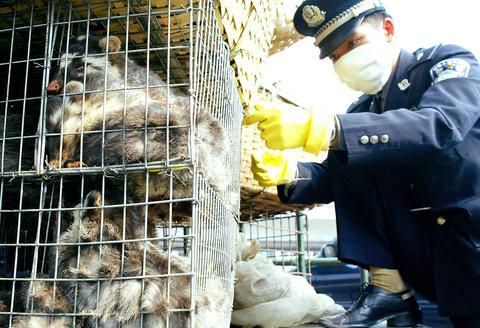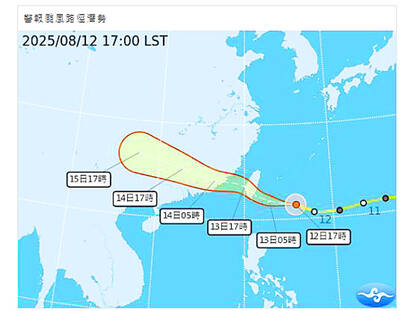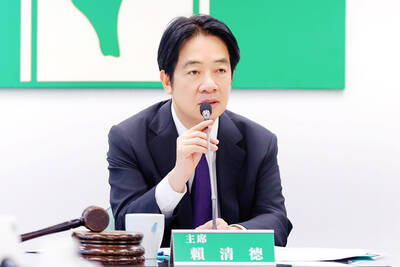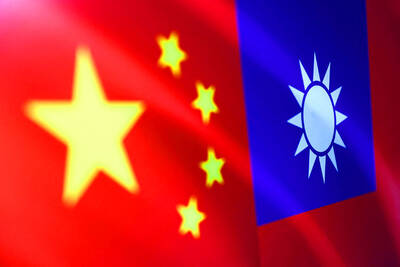China's mass slaughter of civets, which are suspected of spreading SARS to humans, got underway yesterday amid concern by the World Health Organization (WHO) that the killings may increase rather than stop the spread of the disease.
The cull was ordered by the government after China's health ministry and the WHO confirmed Monday a 32-year-old television journalist from southern China's Guangdong Province had the virus, which left around 800 dead and infected 8,000 in a global health crisis last year.
Scientists from China and Hong Kong said a coronavirus found in the weasel-like animals was similar to the SARS virus found in the latest victim.

PHOTO: REUTERS
Guangdong's agriculture, forestry and police officials yesterday fanned out to farms, wildlife markets, hotels and restaurants to round up the animals, which are bred for the dinner table and considered a delicacy.
More than 2,000 of the creatures had been snared from farms by Monday night and officials were expecting to confiscate more yesterday.
The animals will be taken to local animal quarantine centers where they will be killed by drowning in disinfectant then cremated.
"We have a disinfecting pool. We put the civet cats in cages, which hold a maximum of four to five animals each. Then we put them into the pool and drown them," an official with the Guangzhou City Animal Quarantine and Monitoring Institute said.
"We then take them out to be cremated," the official said of the animals.
More than 100 civets in Guangzhou had been killed by this method by early yesterday, another official at the institute said.
Officials estimated that around 10,000 civets would be slaughtered.
WHO officials, meanwhile, warned the slaughter could cause more infections if not carried out properly, such as by exposing the virus to people doing the killing.
"Animals when they're stressed, do shed stronger virus loads. So if the civets are about to be killed, hunted or trapped, they would be shedding viruses more rapidly," said Roy Wadia, a spokesman for the WHO office in Beijing.
"We want to make sure if a slaughter is being done, it minimizes the risks, which is the health hazard this could present to people carrying out the slaughter and the potential risk to the environment," he said.
WHO officials also expressed concerns the civet cull might detract attention from the need to look for other sources of the virus.
"We are just concerned that this focus on the civet cat and the focus on the civet cats being sold in the markets of southern China may be putting too much emphasis on one possible source of infection," Ian Simpson, WHO spokesman in Geneva, told Sydney radio. "The danger then is that we may not find out what the real source was."
While civets and other animals have been found to carry the SARS virus, it was still unknown how humans contracted the pneumonia-like disease.
"We would like more attention to be paid to research," Wadia said. "There's still a lot not known about SARS and its possible source."
The outbreak of SARS, which first surfaced in Guangdong in November 2002, spread panic in China and neighboring countries in Asia, prompting schools and businesses to shut down and damaging tourism and other sectors of the economy.
Also see story:

GET TO SAFETY: Authorities were scrambling to evacuate nearly 700 people in Hualien County to prepare for overflow from a natural dam formed by a previous typhoon Typhoon Podul yesterday intensified and accelerated as it neared Taiwan, with the impact expected to be felt overnight, the Central Weather Administration (CWA) said, while the Directorate-General of Personnel Administration announced that schools and government offices in most areas of southern and eastern Taiwan would be closed today. The affected regions are Tainan, Kaohsiung and Chiayi City, and Yunlin, Chiayi, Pingtung, Hualien and Taitung counties, as well as the outlying Penghu County. As of 10pm last night, the storm was about 370km east-southeast of Taitung County, moving west-northwest at 27kph, CWA data showed. With a radius of 120km, Podul is carrying maximum sustained

President William Lai (賴清德) yesterday criticized the nuclear energy referendum scheduled for Saturday next week, saying that holding the plebiscite before the government can conduct safety evaluations is a denial of the public’s right to make informed decisions. Lai, who is also the chairman of the Democratic Progressive Party (DPP), made the comments at the party’s Central Standing Committee meeting at its headquarters in Taipei. ‘NO’ “I will go to the ballot box on Saturday next week to cast a ‘no’ vote, as we all should do,” he said as he called on the public to reject the proposition to reactivate the decommissioned

US President Donald Trump on Friday said that Chinese President Xi Jinping (習近平) told him China would not invade Taiwan while Trump is in office. Trump made the remarks in an interview with Fox News, ahead of talks with Russian President Vladimir Putin over Moscow’s invasion of Ukraine. “I will tell you, you know, you have a very similar thing with President Xi of China and Taiwan, but I don’t believe there’s any way it’s going to happen as long as I’m here. We’ll see,” Trump said during an interview on Fox News’ Special Report. “He told me: ‘I will never do

EXCEPTIONS: Some people could be allowed to reclaim citizenship for humanitarian reasons or because of their contributions to the nation, the interior ministry said Taiwan would soon unveil new rules banning Taiwanese residents of China from reclaiming their citizenship if they participated in Beijing’s propaganda activities, the Ministry of the Interior said on Monday. The measures were drafted following President William Lai’s (賴清德) March 13 directive that the government counter China’s espionage and influence campaigns aimed at undermining Taiwan’s sovereignty, the ministry said in a preview of the rules. The changes would affect Taiwanese who lost their citizenship after becoming permanent residents of China or obtaining passports issued by China, it said. Under the measures, former Taiwanese nationals living in China who had made statements denying the